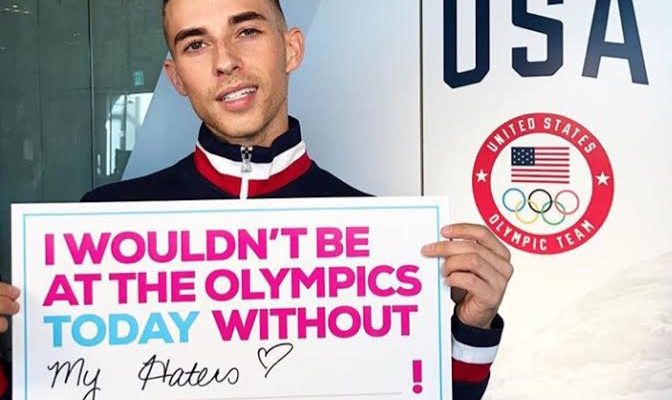When we witness the success of others who have similar identities to ourselves, we intrinsically believe that we can also be successful. Similarly, when these people are shown in a positive way in the media, it validates our sense of belonging and encourages us to pursue endeavors that we may have previously doubted. According to USA Today, U.S. Olympic figure skater Adam Rippon, who is openly gay, received an email of that nature on Feb. 12 through his agent David Baden. Baden told USA Today that the email, sent by an 18-year-old gay man, said how Rippon’s bravery comforts him and is “giving him hope,” especially since the young man’s sexuality is not accepted by his family. We often discuss how positive media representations of race and gender positively influence young people, as well as help them to better understand their identities. However, the same can be said for the representation of sexualities, especially given the tumultuous treatment of LGBTQ athletes. Even so, while Rippon and other openly gay athletes should continue to use their positions to encourage young people, doing so is only part of the solution. More than ever, it is also crucial that the media’s “straight-washing” of prominent LGBTQ figures is eradicated.
Such a case occurred in the same time frame as the email to Rippon. CNN reported that NBC was criticized after not highlighting LGBTQ athletes while recognizing diversity during its coverage of the 2018 Olympics Opening Ceremonies. The “straight-washing,” as Outsports referred to the discrepancy in representation, is particularly alarming, and also harmful to young LGBTQ individuals who are looking for versions of themselves in popular media and culture. Given Outsports’ report that there are 15 out LGBTQ athletes in the 2018 Winter Olympics, there is no justification for that being overlooked, especially when the coverage was focusing on diversity. Even if the number is small compared to known or presumed heterosexual athletes, or even Outsports’ report that 56 out athletes competed at the Rio 2016 Olympics, representation matters. As it stands, Outsports confirmed that the current number of out athletes at the 2018 Winter Olympics “tops the seven from the 2014 Winter Games in Sochi,” none of whom were American. Additionally, the knowledge that an increasing number of athletes are comfortable living their lives as authentically as possible will only encourage young people to do the same.
The critical reason why we need less homogenized representation and fewer filtered images of LGBTQ people goes beyond a sense of balance, and also beyond viewing less caricatured versions of the community in the media. Vox, an American news and opinion website, argues that TV shows such as “Will and Grace” and “Queer as Folk” helped change the landscape for LGBTQ people by showing them as human. Nonetheless, although these shows led to future ones showing more genuine characters, it is also only part of the answer. We need to show that real-life LGBTQ people are not only “accepted” if they keep their sexuality behind closed doors. Rather, they are encouraged to be out if they choose to be, and if they are, that there will not be a lack of regard for them when celebrating diversity and achievements.
Ultimately, we look to those around us for encouragement and support, especially when we are doubting our own worth or purpose in society. For many people, these figures are numerous. More so, if the model one seeks is white and heterosexual, they are likely to be portrayed in a more positive light. The discrepancy remains prevalent largely because the characters we see are often written by those of the same sex or race. As a result, writers are calling on their own experiences, and are using the images of heroes and role models that they saw growing up. The Washington Post suggested that the consequence lends itself to an overwhelming lack of diversity. Subsequently, these limitations also result in a lack of positive role models for sex, racial or sexual minority groups. More so, the U.S. National Library of Medicine indicated in a study that LGBTQ youth are more susceptible to numerous mental health and social issues.
When considering positive factors with regard to diverse communities, the study said, “Youth cited … role models from the media they believed promoted visibility and acceptance for racial and sexual diversity.” For that reason, it is unfortunate that people would still choose to limit the visibility of a group of people merely seeking to be represented for their achievements like anyone else. Moreover, the people who are still being overlooked know what it is like to grow up without role models in the public sphere. If any of them, including Rippon, feel comfortable being that role model for a younger, possibly closeted child or teenager, then the media should embrace the opportunity to shine the light on all aspects of diversity.


Leave a Reply